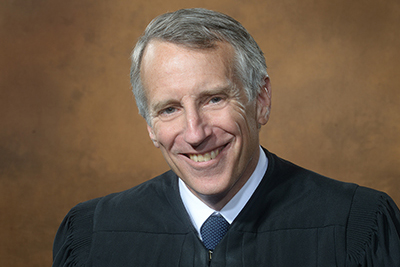Despite the media criticism and sinister pop culture portrayal, America’s surveillance work is not a rogue operation blindly approved by the Foreign Intelligence Surveillance Court (FISC), according to a veteran judge who spoke at Boston College Law School on January 19.
Giving a rare insider view of America’s most highly classified court, Justice Dennis Saylor IV rejected claims that FISC simply “rubber-stamps” all requests made by intelligence agencies.
“Almost everything you know about this work is probably wrong in one way or another. We are the only country in the world, the only one out of 197 sovereign nations, that interposes a court between the government and its citizens under circumstances like this,” he said. “Obviously, in Russia, China, Iran, and North Korea, the government can tap your phones and read your emails. But that is also true in Canada, Germany, the United Kingdom, Japan, and Australia.”
Justice Saylor, who is among the 11 judges tasked to review requests for warrants against foreign spies and suspected foreign terrorists residing in the US, said that around 25 percent of the requests are modified in some way before being approved.
“We are a branch of the United States courts and we have our own independent role in the system,” he said.” I don’t see it any different from a Title III wiretap on a drug dealer. If that doesn’t result in a criminal case, because sometimes it doesn’t, it remains a secret,” he said.
The inherent secrecy of the court’s work is troublesome to a lot of people, he said, but the FISC operates under congressional oversight, and the court is becoming more transparent. For example, FISC is now required to publish non-classified portions of the court’s opinions.
“Obviously, you have to balance different factors. You need protections, you need checks and balances. And it’s a fair debate whether the checks and balances are sufficient. But there’s no doubt in my mind that it has to be ex parte, it has to be one-sided, and it has to be done secretly,” he said.
Justice Saylor also said that NSA leaker Edward Snowden did “massive damage” to America’s intelligence operations with his 2013 revelation, which resulted in the “bad guys” using more sophisticated, modern systems to communicate with one another.
“I only know what I see through my little window into this world, and I don’t sympathize with the NSA, the CIA, or the FBI. But if you meet those people and get to work with them, you’ll find that they are ordinary people, they are ordinary Americans like you, often doing extraordinarily difficult work under tremendous pressure,” he said.
Justice Saylor was nominated to the US District Court of the District of Massachusetts by President George W. Bush in 2003 and confirmed by the Senate in 2004. He was appointed to FISC by Chief Justice John Roberts in 2011 to serve a seven-year term that ends in May.
His presentation was hosted by Boston College Law School’s Federalist Society.


